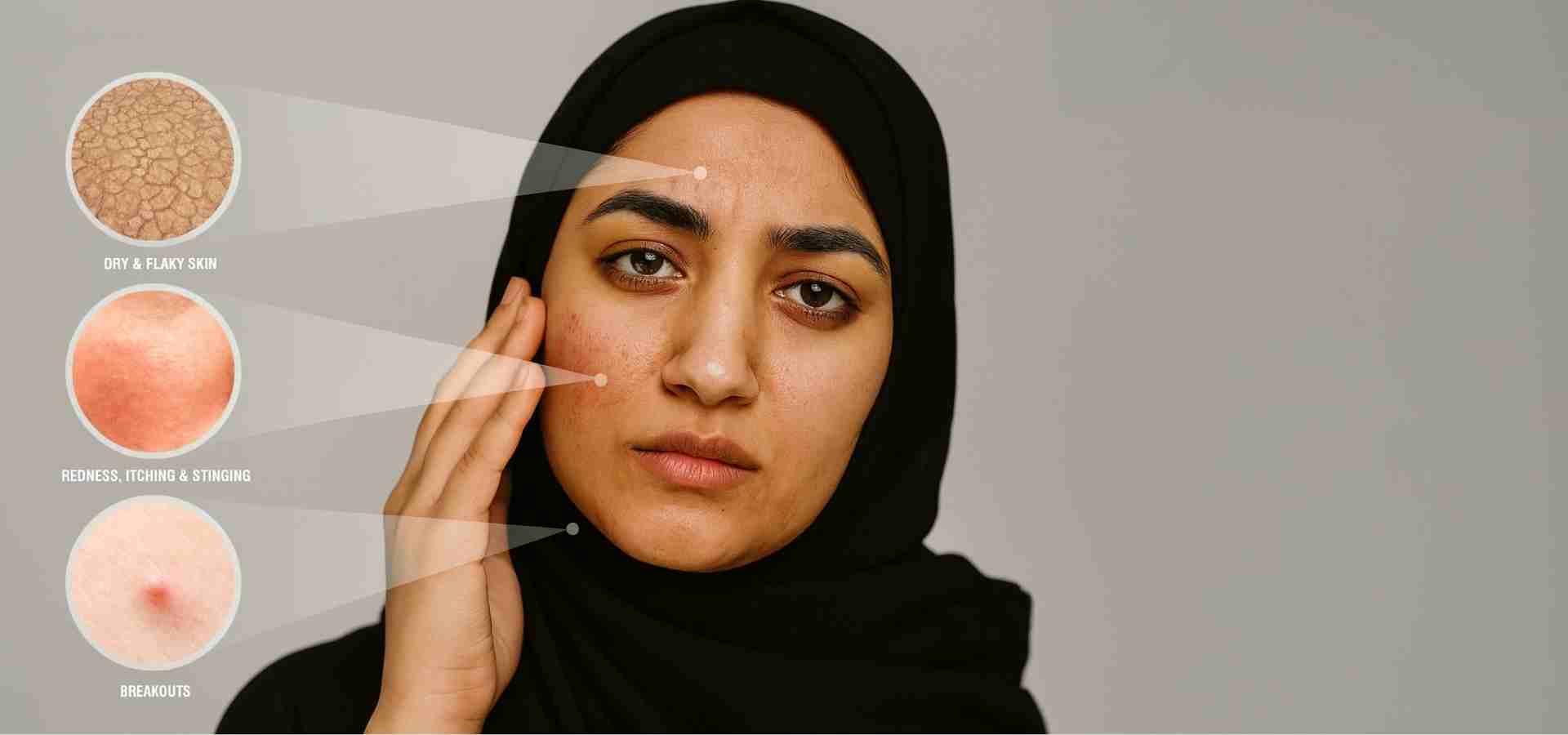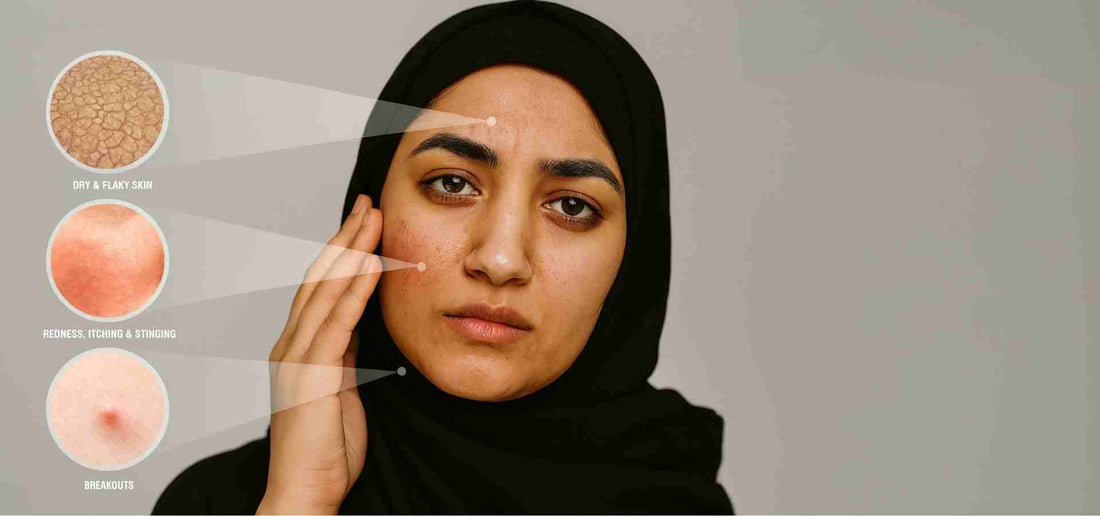If you live in the United Arab Emirates, you are aware of the challenge: intense heat and sun throughout the day, followed by cold air conditioning indoors. No matter what you do, this continuous changeover can make your skin feel tight, dry, and sensitive. The harsh weather in the United Arab Emirates actually puts a lot of strain on the skin barrier, which is your skin's natural defense, also known as, “Skin Barrier”.
What is the Skin Barrier?
Your skin's outermost layer, known as the skin barrier, serves as the body's first line of defense against the environment. Think of it as a thoroughly built wall of bricks, with the skin cells serving as the bricks and the lipids - natural fats your body produces - acting as the mortar to keep the bricks securely in place. Because it keeps necessary moisture sealed inside your skin and inhibits harmful substances like pollutants, irritants, bacteria, and allergies from penetrating and causing damage, this barrier is crucial. Your skin feels soft, supple, and resilient when this barrier is strong and undamaged. It can also keep a regulated level of hydration and defend against outside stressors. However, the protective "mortar" starts to disintegrate when the skin barrier is weakened or damaged, allowing moisture to leave and dangerous substances to enter through the spaces between skin cells. Dryness, irritation, redness, and heightened sensitivity result from this, increasing the skin's vulnerability to problems like inflammation, acne, and even early aging symptoms like wrinkles and fine lines. The epidermal barrier has ongoing difficulties that can impair its function in harsh environments like the United Arab Emirates, where the daytime heat and strong sun are followed by cold, dry air from inside air conditioning. Protecting your skin and maintaining its health, hydration, and radiance in spite of the demanding environment requires an understanding of how this barrier functions and what influences it.
How Does UAE’s Heat Affect Your Skin Barrier?
Summer temperatures in the UAE can rise beyond 40°C, forcing your body to cool itself by sweating excessively. Sweating has drawbacks for your skin even though it's a healthy and efficient strategy to control body temperature. In addition to removing heat, sweat also removes sebum, the natural oils that are essential for retaining and securing moisture in the skin. Your skin's surface gets dry and more prone to irritation and damage when these protecting oils aren't there. By weakening the skin barrier and making it more difficult for your skin to retain moisture, this loss of natural oils upsets the delicate balance your skin needs to keep hydrated and resilient.
In addition to the extreme heat, the UAE has one of the strongest suns in the world, with high UV Index values all year round. The vital proteins collagen and elastin, which give your skin its firmness, elasticity, and youthful bounce, are harmed by these ultraviolet (UV) rays because they pierce deeply into the layers of your skin. The structure of the epidermal barrier is impaired when UV radiation breaks down these proteins, which results in less defense against environmental stresses. This damage increases your skin's sensitivity and tolerance to inflammation over time, hastening the onset of obvious aging symptoms including wrinkles, sagging, and loss of radiance.
Contrary to popular belief, sweating does not indicate that your skin is sufficiently moisturized. The intense heat actually dehydrates your skin more than it hydrates it. This causes cellular dehydration, which makes your skin feel flaky, dry, and tight. Heat stress causes moisture to evaporate continuously, which further impairs the skin barrier's ability to work properly. This can lead to a vicious cycle of dryness and irritation that can be challenging to break without the right treatment.
How Does Air Conditioning Affect Your Skin Barrier?
Although air conditioning is a lifesaver in the United Arab Emirates due to the extreme heat outside, it can unintentionally cause skin damage. In addition to chilling the air, air conditioners also eliminate humidity, frequently bringing indoor humidity levels down to less than 30%. This produces an atmosphere that is far drier than what is ideal for your skin's normal growth. Dehydration results from the absence of moisture in the air around you, which starts to draw water away from the surface of your skin. This continuous loss of moisture might eventually cause your skin to feel unpleasant, tight, and dry.
Long-term exposure to this cool, dry indoor air also affects your skin's natural defenses more deeply. Do you recall the lipid "mortar" that binds the cells of your skin together? These lipids degrade in the dry air, which makes the skin cells less cohesive. Your skin consequently loses its capacity to efficiently retain moisture and protect itself from outside aggressors. In addition to accelerating water loss, this barrier damage increases the likelihood of irritation and inflammation by making it more simpler for bacteria, allergens, and pollutants to enter your skin.
Your skin becomes more sensitive and reactive once dry indoor air compromises the skin barrier. Increased redness, itching, or an overall uneasy feeling could be seen. This increased sensitivity causes pre-existing illnesses like rosacea or eczema and increases the likelihood of flare-ups. In other words, if you don't take precautions to protect your skin, the air conditioning that is supposed to relieve the heat might actually make it drier, more delicate, and less resilient.
The Cycle of Damage
Your skin barrier is constantly strained when you move back and forth between the intense heat outside and the cool, dry air-conditioned space inside. Your skin is exposed to radically contrasting extremes throughout each transition: dry, moisture-sucking air indoors, followed by powerful UV rays and heat outside that remove moisture and natural oils. It is challenging for your skin's protective layer to completely heal and regenerate because of the ongoing harm caused by this continuous cycle. Your skin thus finds it difficult to retain the moisture it requires to remain supple and velvety. This continuous disturbance eventually results in discomfort, heightened sensitivity, and chronic dryness. Additionally, your skin's surface may become uneven and lifeless, losing its natural radiance.
Unchecked, this cycle can hasten premature aging and cause fine lines, wrinkles, and a loss of firmness far earlier than is typical. In essence, prolonged stress impairs your skin's natural defenses, making it prone to environmental harm and obvious aging symptoms.
In Conclusion
To get healthier, more robust skin, it is essential to first understand how the severe environment of the United Arab Emirates impacts your skin barrier. Understanding the difficulties caused by extreme heat, strong UV radiation, and dry indoor air will help you understand why your skin can occasionally feel dry, sensitive, or irritated. In our upcoming blog post, we'll walk you through easy, doable daily routines created especially to preserve and repair your skin barrier in this demanding setting. No matter how bad the weather gets outside or how chilly the air conditioning gets inside, you can maintain naturally glowing, well-balanced, and highly hydrated skin all year long with the correct care and consistency.


